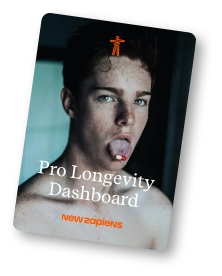Rethinking Fertility: 10 Lessons on Reproductive Longevity

The first time I confronted my own fertility, I realized how little I knew. I had spent years planning my career, my finances, even my holidays, but when it came to my reproductive health, I was in the dark. This is not just my story. It’s the story of millions of people.
We need to change the narrative around (in)fertility and reproductive longevity – from silence, shame, and last-minute panic to prevention, knowledge, and empowered decision-making. Over the last years, both as an individual and as a founder working in reproductive health, I’ve learned lessons that matter for everyone.
Here are ten of them.
#1 Silence is the biggest enemy
Fertility and infertility are still taboo. We whisper about them, avoid the topic, and often only confront it when it’s already urgent. This silence leaves people powerless and isolated with their questions. Breaking the taboo is the first step toward change.
#2 Fertility is not infinite
It sounds obvious, but many of us don’t realize how real the timeline is. According to the WHO, about 1 in 6 people worldwide experience infertility at some point in their lives. Biology matters: ovarian aging happens earlier and faster than most imagine, and male fertility also changes over time, even if more gradually. None of this should cause panic, but it should create awareness.
#3 Prevention matters in reproductive health
We accept prevention in almost every other field of medicine – from cholesterol checks to cancer screenings. Yet reproductive health is often treated only when a problem arises. Early and regular fertility testing, whether hormone levels or sperm quality, allows trends to be tracked over time. This shift from reaction to prevention can make the difference between limited options and real choice.
#4 Knowledge is not pressure
Some people fear that fertility testing will create stress or urgency. But information doesn’t force action, it creates freedom. Just as financial literacy helps you plan without dictating how to spend, fertility knowledge gives you the ability to align your reproductive health with your life goals.
#5 Freezing should become the new normal
Egg and sperm freezing are among the most powerful tools modern medicine has given us to extend reproductive options. Preserving cells early dramatically improves the chances of success later – which is why freezing should be seen less as a desperate last resort and more as a standard form of prevention. At the same time, it’s not a perfect guarantee: biology, age, and numbers still matter. But just like with health insurance, the earlier you invest, the more security and freedom you gain for the future.
#6 Your doctor might not mention it
Healthcare conversations often center on treatment, not prevention. Many doctors only raise fertility questions when someone is actively trying to conceive. By then, time may already be critical. Patients who ask early, insist on clear answers, and seek second opinions when necessary are better positioned to protect their options.
#7 Lifestyle influences reproductive health
Biology sets the timeline, but lifestyle shapes the quality of that journey. Research shows that factors like smoking, chronic stress, poor sleep, and exposure to toxins can accelerate fertility decline, while balanced nutrition and regular exercise support hormonal health. These choices cannot stop aging, but they can improve overall reproductive resilience.
#8 Conversations should start earlier
Fertility is rarely a solo matter. Whether in a partnership or considering future family plans, transparency helps align expectations. Studies suggest that couples who discuss fertility earlier experience less stress and make decisions more collaboratively. Opening the dialogue may feel uncomfortable but avoiding it often carries heavier costs later.
#9 Every timeline is different
There is no universal fertility path. Some people conceive naturally later in life, while others face challenges much earlier. Genetics, health conditions, and lifestyle all play a role. Comparing your journey to someone else’s creates confusion rather than clarity. What matters is making informed choices that fit your own life, not someone else’s story.
#10 Changing the narrative is power
Reproductive longevity isn’t just a personal issue – it’s a societal one. Infertility already affects 1 in 6 people globally, and demographic changes make this an urgent public health challenge. By shifting the narrative from secrecy to openness and from short-term fixes to long-term prevention, we can influence policy, research, and healthcare systems. Empowering individuals starts a cultural shift and one that benefits entire generations.
Finishing up…
For me, reproductive longevity is not just a scientific topic – it’s a matter of fairness, dignity, and freedom. People deserve access to the truth about their bodies early enough to make real choices.
At Fyrce Care, we focus on prevention and education for women: offering at-home fertility testing and personalized programs designed to boost egg health and turn knowledge into action. Our goal is to give women clarity about their options, so decisions about freezing, family planning, or lifestyle changes can be made with confidence instead of confusion.
Author: Johanna Rief
Johanna Rief has over 11 years of experience shaping the sexual wellness and health industry. She led global PR & Partnerships at Lovehoney Group, supporting its growth to 1,000+ employees and a $1.2B valuation, and held a leadership role at Amorelie. With this strong track record, she is now building Fyrce Care to redefine prevention and education in reproductive health. Her vision: to empower women with clarity, confidence, and control over their fertility and longevity.




